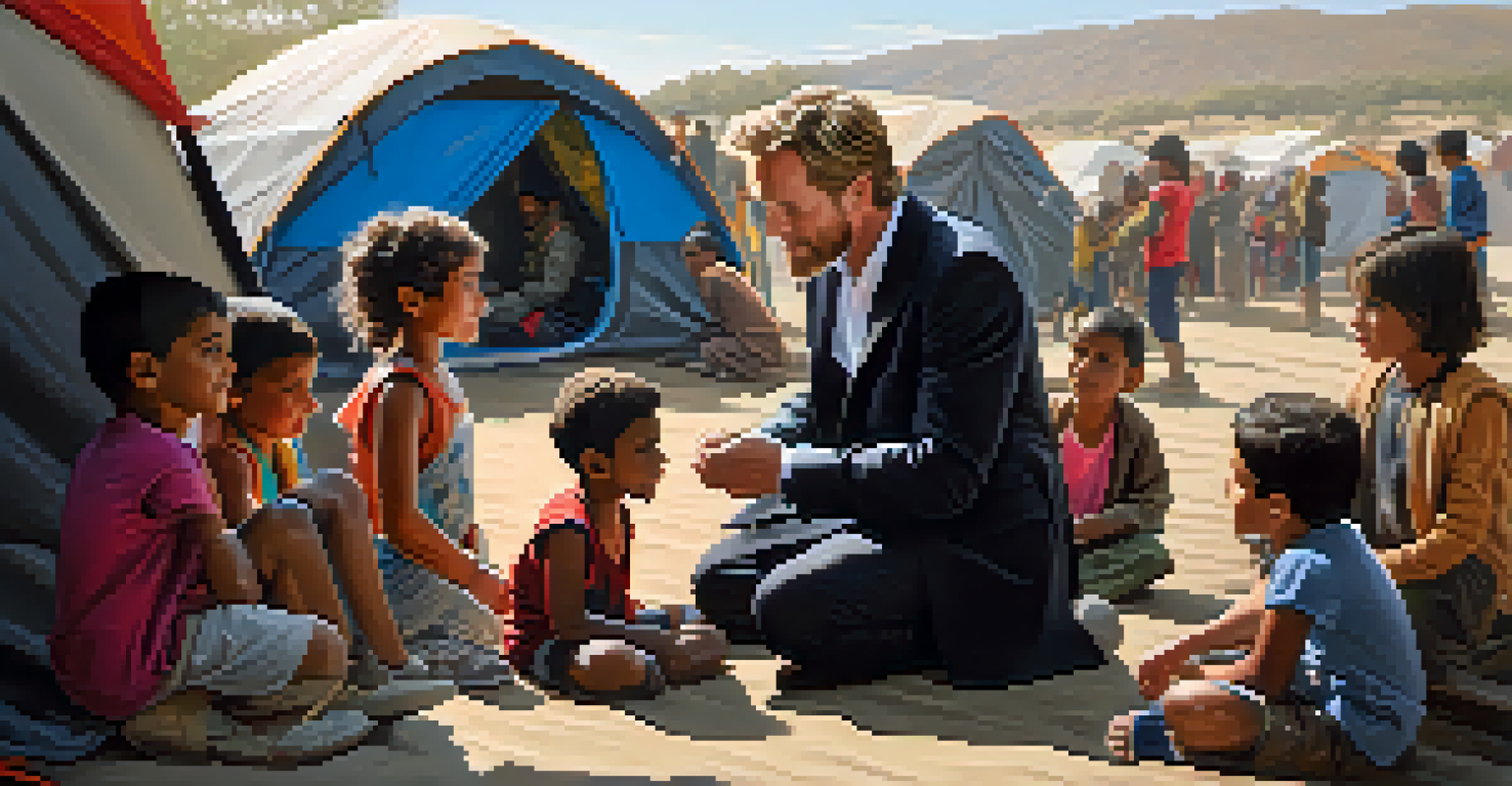Cultural Diplomacy: The Role of Hollywood in Politics

Understanding Cultural Diplomacy and Its Importance
Cultural diplomacy refers to the use of cultural tools and exchanges to foster mutual understanding between nations. It goes beyond mere politics, focusing on soft power—an approach that emphasizes influence rather than coercion. This type of diplomacy aims to build relationships and promote national interests through culture, education, and the arts.
Cultural diplomacy is the bridge that connects nations through shared values and experiences.
In an increasingly interconnected world, cultural diplomacy plays a vital role in bridging gaps between diverse societies. It helps in addressing global challenges by creating a common language through shared cultural experiences. This is especially important as misunderstandings can lead to conflicts, making cultural exchange a powerful tool for peace.
Hollywood, as a leading cultural exporter, has a unique position in this landscape. Its films, music, and celebrities often transcend borders, making them instruments of cultural diplomacy. By shaping perceptions and narratives, Hollywood can influence how countries and their citizens view each other, paving the way for dialogue and collaboration.
Hollywood's Global Reach and Influence
Hollywood's influence stretches far beyond the United States, with its films being consumed worldwide. Movies like 'Black Panther' and 'Crazy Rich Asians' not only entertain but also highlight cultural narratives that resonate with audiences across the globe. This reach enables Hollywood to become a significant player in international cultural exchanges.

The global appeal of Hollywood exists partly due to its ability to address universal themes such as love, conflict, and ambition. These stories make connections that transcend cultural barriers, allowing for a shared understanding among diverse audiences. Consequently, Hollywood shapes perceptions of different cultures, sometimes even redefining them in the process.
Cultural Diplomacy Explained
Cultural diplomacy uses cultural exchanges to build mutual understanding and promote national interests through soft power.
Moreover, Hollywood's portrayal of specific countries can impact diplomatic relations. For instance, a film that depicts a country positively can enhance its image abroad, while negative portrayals can lead to misunderstandings. This power to influence public opinion underscores Hollywood's role as a cultural diplomat.
Case Studies: Films that Shaped Political Narratives
Several Hollywood films have played pivotal roles in shaping political narratives and public opinion. For example, 'The Hurt Locker' brought attention to the complexities of the Iraq War, influencing how viewers perceived American military actions. It highlighted the human cost of conflict, thus fostering a deeper discussion about war and its implications.
The movies are the greatest tool of cultural diplomacy we have; they can create empathy and understanding across borders.
Another notable example is 'Hotel Rwanda,' which raised awareness about the Rwandan Genocide. By depicting the harrowing events through a personal lens, the film sparked international conversations about humanitarian intervention and responsibility. It exemplifies how storytelling can evoke empathy and prompt action on global issues.
These case studies illustrate that Hollywood's storytelling can serve as a catalyst for social and political change. When films resonate with audiences, they can inspire movements, inform policies, and encourage deeper engagement with pressing global challenges.
The Role of Celebrities as Cultural Ambassadors
Celebrities often serve as cultural ambassadors, leveraging their fame to promote causes and foster international understanding. Figures like Angelina Jolie and Leonardo DiCaprio use their platforms to draw attention to critical issues such as climate change and refugee crises. Their involvement highlights how celebrity influence can extend beyond entertainment into the realm of diplomacy.
When these stars engage with global issues, they humanize complex topics, making them more relatable to the general public. Their stories and advocacy work inspire audiences to learn more and take action. This connection can bridge cultural gaps, fostering empathy and understanding across borders.
Hollywood's Global Influence
Hollywood shapes perceptions of cultures worldwide, affecting international relations through its storytelling and media reach.
Moreover, celebrities can facilitate cross-cultural dialogue by participating in international events and collaborations. Their presence can attract media attention, amplifying the importance of cultural diplomacy in addressing global challenges. This synergy between fame and advocacy underscores the potential of Hollywood figures to impact politics positively.
Challenges and Criticisms of Hollywood's Influence
Despite its potential for positive impact, Hollywood's influence is not without challenges and criticisms. One concern is the oversimplification of complex cultural narratives. Films often prioritize entertainment over accuracy, which can lead to stereotypes and misconceptions about different cultures.
Additionally, the dominance of Hollywood can overshadow local film industries, potentially stifling diverse cultural expressions. When American films dominate the market, they can marginalize local voices and perspectives, leading to a homogenization of cultural narratives. This raises questions about representation and authenticity in storytelling.
Moreover, Hollywood's focus on profit can sometimes conflict with its role as a cultural diplomat. Commercial interests may drive the production of films that prioritize marketability over cultural sensitivity. This tension highlights the need for a balanced approach that respects local cultures while fostering global connections.
The Future of Cultural Diplomacy in a Digital Age
As the world becomes increasingly digital, the landscape of cultural diplomacy is evolving. Streaming platforms like Netflix and Amazon Prime are changing how films and shows are consumed, allowing for greater access to diverse voices and stories from around the world. This shift can enhance cultural exchange and broaden perspectives.
Digital platforms also facilitate global conversations, enabling audiences to engage with content from various cultures. Social media allows for immediate feedback and interaction, creating a two-way dialogue that can enrich the cultural exchange process. This interconnectivity presents new opportunities for Hollywood to engage with international audiences.
Challenges in Representation
Despite its potential, Hollywood faces criticism for oversimplifying narratives and overshadowing local cultures in its global dominance.
However, the digital age also brings challenges, such as the spread of misinformation and cultural appropriation. As Hollywood navigates this landscape, it must remain mindful of its responsibilities as a cultural diplomat. By fostering authentic representations and promoting inclusivity, Hollywood can continue to play a significant role in global cultural diplomacy.
Conclusion: Hollywood's Role in Shaping Global Relations
In conclusion, Hollywood's role in cultural diplomacy is multifaceted and significant. Through storytelling, celebrity influence, and global reach, it has the power to shape perceptions and foster understanding between nations. As a cultural ambassador, Hollywood can bridge divides and promote dialogue on pressing global issues.
However, the industry must navigate the challenges of representation and authenticity to ensure that its influence is constructive. By prioritizing cultural sensitivity and inclusivity, Hollywood can continue to enhance its role in diplomacy, contributing to a more interconnected and empathetic world.

Ultimately, as we move forward in an increasingly globalized society, Hollywood's responsibility as a cultural diplomat will only grow. Its ability to entertain and educate positions it uniquely to influence positive change, making it an essential player in the landscape of international relations.